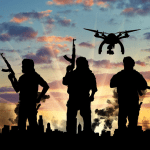Following the meeting of Russian President Vladimir Putin with German Chancellor Olaf Scholz there appeared several signs suggesting the crisis may be leveling off after weeks of escalation and tension with so many developments sprouting up to the point that a date was set for an imminent war between Russia and Ukraine.
The first of these signs was dialogues centering around the Donbas region in eastern Ukraine, addressing its fate and Russia’s position on the separatist-controlled areas in Donbas, which aren’t recognized by any government, not even Moscow that has been backing this military conflict with Kiev for years.
Until this muddle is cleared up and the scene becomes relatively stable enabling a thorough reading of what Russia stood to gain from this unsurprising furor, that seemed more of a reshuffling of the ranks of the Western camp and a test of the stability of its footing on the ground (considering this is what both parties were striving to achieve over the past days of the ongoing crisis), it would be beneficial to look into the views and analyses of those on the scene. Noteworthy, the Center of Arab Eurasian Studies (CAES) made a notable contribution in this respect by soliciting the views of outstanding Russian and Ukrainian experts in political and strategic sciences.
An in-depth look into the insights of those at the center of events helps avoid the media traps and mines laid in the way of such interlocking crises.
Towards a clearer and more comprehensive picture, we will start with views of one of the most prominent and prestigious Russian Experts, Professor Aleksandr Dugin, a Russian philosopher, political analyst, strategist, and a public figure considered to have direct influence on the thought of President Vladimir Putin.
Dugin, who is Professor and Head of the Department of Sociology of International Relations at the Faculty of Sociology of the Moscow State University, founder of the global Eurasian Movement, and author of “Salvation from the West: Eurasia and Indigenous Civilizations versus Atlantic Civilizations”, sees that the current Russo-Western crisis between Russia and the west is neither gas- nor economy-related.
This political conflict, according to Dugin, presents us with several complex procedures that gave rise to cultural and geopolitical transformations, where the economy and energy stay on the sidelines.
Dugin sees that, from a cultural point of view, it is all about the ideology of the Democrats of the Biden administration –that alliance of radical globalists, neo-conservatives, and liberal hawks. Those see that the unipolar world and Western hegemony are collapsing and are then ready to do whatever thing to prevent this, even if this took it to a third civil war.
According to Dugin, radical globalists have many enemies within their camp, including Donald Trump as well as others of his kind. However, there remain two powers capable of challenging this Western hegemon, namely China and Russia, the first being an economic giant and the second a military one, and both have the same shared goals in this confrontation.
When it comes to the current crisis, Dugin sees that US President Biden tries to push Russia away from Europe, the latter is striving to build its own independent policy. Hence arose the current Ukrainian crisis and the recent escalation around Donbas, through demonizing Russia and Putin and accusing him of preparing to invade Ukraine. While there is no basis for this alleged invasion, Washington is behaving as if the invasion had already taken place.
Further, there has been talk about sanctions and potential preventive military actions in Donbas. Therefore, disputes over gas and Nord Stream 2 remain only tools that serve the current geopolitical war.
The same is true of China, against which Biden forged AUKUS alliance with two Anglo-Saxon countries, i.e. Australia and Britain, and another Asian alliance, i.e. the Quadrilateral Security Dialogue (QUAD), with Japan and India.
Overall, this conflict is primarily a geopolitical one, an exact replication of other transatlantic projects of the British intellectutal Halford Mackinder to the former US National Security Advisor Zbigniew Brzezinski.
Dugin indicates that the current escalation comes as a response to the West’s geopolitical war. Russia responds back from a Eurasian geopolitical standpoint, standing out against coercive unipolar globalization and liberalism with its new Western values, while proposing an alternative value system, receiving broad Chinese support.
For these reasons, Dugin believes the main drivers for the current crisis –which could unfold into a second cold war with the possibility of its escalation under certain circumstances provoking an all-out regional war that could rise to a global war– aren’t economic nor political but rather existential.
Given subjective perceptions of drivers of tension relating to either “humiliating” or glorifying Russia and upon evaluating the situation given statements and actions of President Vladimir Putin, we can say he is on track to address these errors and historical grievances by restoring a bipolar international system, or even tripartite one comprising the United States, Russia, and China and consolidating it through the Yalta II pact.
Putin may also work to revive the “red lines” and areas of influence policies and liquidate or freeze NATO, towards “reunification of Russian people,” of whom the peoples of Ukraine and Belarus are an integral part, correcting “mistakes of history”, namely “Ukraine” and “Belarus” through establishing one geopolitical, geographic, and economic sphere on the territory of the former Soviet Union.
It is not about compelling the West to recognize Crimea as part of Russia, nor transforming the Russian Federation into an Empire, it is about a total restructuring of the world order and the entire global security system based on new paradigms, principles, and values that are “more rigorous and updated”.
In this article, we presented the views of a prominent Russian intellectual on what is going on in the Kremlin. Next week, we will review views of leading Ukrainian thinkers, looking into how they read the current scene, how they geared up for it, and how they respond to Putin’s description of Ukraine as a “historical mistake”.












